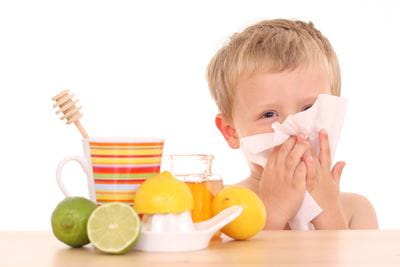Is homeopathic medicine a good alternative for my child?
While scanning the shelves of your neighborhood pharmacy looking for a product to help your sick child, you’ve undoubtedly run across homeopathic medicines at some time or another. These alternative therapies offer to treat a child’s teething pain, tummy trouble, colic, earaches, allergies, coughs and colds (among other common problems) and often make nearly irresistible promises about your child’s health and wellbeing.
Homeopathic remedies on your pharmacy shelves include brand names such as Hylands, Boiron, Kids 0-9 and various generic drugstore brands as well. These products promise to cure what is ailing your child and to do it safely, effectively, gently, and naturally, with no drug interactions and no side effects. Who wouldn’t want that?
I’m a pharmacist; it’s my job to know medicine. I also have two children- ages 7 and 3- and when they are sick I want desperately to ease their pain and discomfort. These same claims that scream at you from the boxes on your pharmacy shelves scream at me too, and they are very enticing. However, I can tell you with certainty that I have never given my kids a homeopathic remedy.
Here’s why:
The product claims sound too good to be true because they are.
Homeopathic medicine is based on the idea that “like cures like.” Practitioners of homeopathy believe that healing occurs when a person is given a substance that produces the same symptoms in healthy people as the symptoms of their illness. They believe that by giving the lowest possible amount of the active ingredient, the more effective the treatment is. Therefore, homeopathic remedies are often heavily diluted with inactive ingredients, often to the point that there is no trace of active ingredient in the mixture.
 While this is marketed to be a “natural” way of curing disease that doesn’t have the side effects traditional medicines have, there are several problems with this claim. According to the National Institutes of Health, our nation’s premier medical research agency, the concept of homeopathy is in direct opposition to basic concepts of chemistry and physics.
While this is marketed to be a “natural” way of curing disease that doesn’t have the side effects traditional medicines have, there are several problems with this claim. According to the National Institutes of Health, our nation’s premier medical research agency, the concept of homeopathy is in direct opposition to basic concepts of chemistry and physics.
Furthermore, there is no reliable medical evidence to suggest that homeopathic medicines are effective in treating any medical condition. While those who profit from this practice would have you believe that it is backed by medical science, this is simply untrue. (For more information about comprehensive medical studies disproving the benefit of homeopathic medicines, see this list of references provided by the National Institutes of Health).
It’s important to recognize that although homeopathic products may be represented by good marketing, this doesn’t mean there is quality scientific evidence to support those claims.
Government oversight of these products isn’t enough to ensure safety.
It is worthwhile to note that homeopathic medicines (just like dietary supplements) are not regulated by the U.S. Food and Drug Administration (FDA) in the same way that conventional medications are. The FDA is not required to determine safety or effectiveness of a homeopathic product before it hits the shelves- they only have the power to ask the manufacturer to remove the product from the shelves if there is a safety concern. In other words, manufactures don’t have to prove that their products have any health benefit whatsoever, and someone usually has to get hurt before the FDA can step in and remove the product from consumer shelves.
When the label of a product on your pharmacy shelf makes a claim, our current legal system, unfortunately, does not provide us the protection of relying on these claims to be true. It also does not offer us the reassurance that the products are safe.
There is a general misconception that “natural” products are safer than traditional medicines, but this is not an accurate assumption. Toxic chemicals can be obtained from plant and animal sources just as they can be derived in a laboratory; just because they are “natural” doesn’t mean they are safe. Every medicine should be tested and subjected to rigorous scientific inquiry in order to know how it affects the body.
A recent example of homeopathic products that have been removed from shelves due to safety concerns include children’s ear drops and teething tablets containing belladonna (a substance that can be fatal to children in large doses).
I choose medicine for my children based on scientific evidence, not feelings or fears.
I believe that one of the reasons homeopathic medicines have such an appeal is that the market taps into our feelings and fears about illness. When we’re sick or our children are sick, it gives us a sense of control to treat the illness with medicine, even when our doctors tell us that the medicine isn’t necessary or useful.
Here’s an example I’ve seen that supports this idea:
 Medical evidence has proven that traditional cough and cold medicines for children are no more effective than placebo, but pose considerable risk for little ones. These cough and cold products marketed for children have been largely removed from the market or undergone considerable changes to their labeling to reflect this recommendation based on medical evidence.
Medical evidence has proven that traditional cough and cold medicines for children are no more effective than placebo, but pose considerable risk for little ones. These cough and cold products marketed for children have been largely removed from the market or undergone considerable changes to their labeling to reflect this recommendation based on medical evidence.
As these conventional cough and cold products for kids have disappeared from the shelves, the sale of homeopathic medicines and “natural” supplements marketed for cough and cold in kids has skyrocketed. Why? Because we parents just want to help, want to give our kids something, and we desperately want to believe that the marketing these companies put in front of us are true. (Many are also unaware of the differences between traditional over-the-counter medications and homeopathic medications and the way they are regulated).
This idea that “natural is better” is a common one, and companies have made billions of dollars by selling that idea to the general public.
As for me, I’m not interested in framing my worldview around my kids’ health. I simply want to know what is best for them, and I define what’s best by safety, efficacy and long-term outcomes derived from scientific study.








